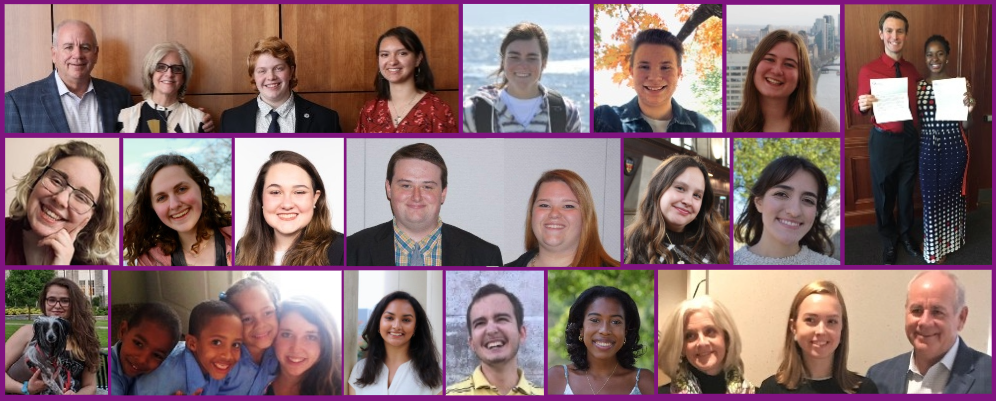
2024-2025
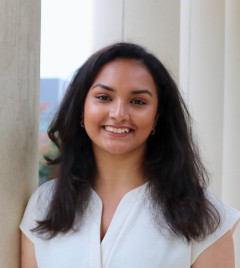 Iman Najeeb
Iman Najeeb
"Civic Outcomes From Deliberating Across Divides"
I am a proud Pakistani and first-generation college student studying Health Services Administration with a Business Honors minor. As a Centennial Scholar at James Madison University, I have committed myself to academic excellence, but more than that, I have made it my mission to use my voice and lived experience to push for equity where it matters most: at the intersection of policy and community.
At JMU’s Madison Center for Civic Engagement, I lead programs like Better Conversations Together: Deliberation that bring students together across divides to talk about real issues—things that matter, even when they’re hard to talk about. I believe in building connection, empathy, and understanding, one conversation at a time. That’s something I believe Whitten Maher stood for, and it’s why my work feels so personal. I aspire to highlight Whitten Maher’s legacy of using communication to build connections and bring light, promoting empathy and understanding in our community. It’s not just about dialogue; it’s about change.
Along the way, I have also been part of the executive team for Women in Technology and worked as a Media & Operations Assistant at the University Career Center. Each role has shaped the way I lead, listen, and advocate. In the long term, I am focused on health policy, working toward solutions that actually reflect and serve communities like mine. I'm here to break cycles, build bridges, and make space for voices that have not always been heard!
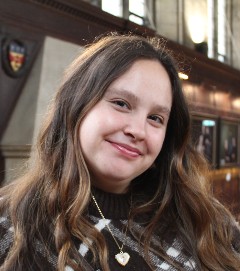 Jillian Kotin
Jillian Kotin
Life Without My Brother: A Family's Communication After Suicide
I love writing, and I make sense of life through writing. I am passionate about poetry and about words that fit together well, no matter the discipline or genre. My folders overflow with essays I wrote for myself, with no prompts and no deadlines.
At James Madison, I have majored in Writing, Rhetoric and Technical Communication and minored in Legal Studies, Family Studies, and British Media Communication. Outside the classroom, I have served as a consultant in the University Writing Center and as an editor for the James Madison Undergraduate Research Journal.
In "Life Without My Brother: A Family's Communication After Suicide," created for one of my SCOM Family Communication courses, my love of writing helped me through an essay that starts with the day in late 2016 that my brother Jake took his own life and then focuses on my experiences and my parents' efforts since then to protect our family from even more change and loss. As I am immensely grateful to my parents and their work to remain strong for me, I know that my brother's suicide forever changed our familial relationship, and I know that we will continue to work through our loss in different ways through the rest of our lives.
Every family experiencing grief struggles together, and every family experiences grief differently. A part of the struggle comes from our society's lack of mental health awareness. When a family's loss is a loved one's suicide, the family often endures scrutiny and even backlash. I am incredibly inspired by Whitten Maher’s ability to empathize with those around him, and I constantly look to do the same. My goal in researching and writing this paper was to educate on the realities of mental illness, suicide, and family grief.
2023-2024
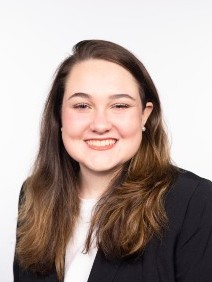 Charlotte Miller
Charlotte Miller
"Changing The Face of Beauty: See Me In 2023"
I am a junior Media Arts and Design major with a minor in Sports Communication from Purcellville, Virginia. I currently work as a Media Production Assistant for JMU Libraries and as the lead Replay Operator for Daktronics for all JMU football and basketball games.
I also serve as a student volunteer for JMU Athletics Creative Services. My passion has always been sports visual storytelling that portrays the action and reveals the athletes' passion, commitment, and dedication. After I graduate, I aim to work for a professional sports team in creative media or studio production.
In the spirit of Whitten Maher, I am passionate about shaping media that incites meaningful change. Whitten's principle, that everyone deserves a voice, echoes within me, especially in my advocacy for individuals with disabilities. Being diagnosed with Autism Spectrum Disorder has made me conscious of my uniqueness since my youth. I want to let other children like me growing up know that they can be represented in the media. I want to help make videos that recognize minorities and that express the beauty in being different. My ambition is to be part of crafting videos that not only recognize but also exalt the diverse tapestry of minority communities.
Over the 2023 summer, I had a fantastic opportunity to work with the Changing the Face of Beauty nonprofit and with Love Runs Wild Photography owner Jill Mandichak in Leesbug, Virginia. Changing the Face of Beauty is committed to equal representation of people with disabilities in advertising and media worldwide. It was inspiring to meet exceptional individuals from all over the East Coast with disabilities and to hear their stories. It was inspiring also to meet parents and guardians who allowed their children to have their photos taken so that other kids with disabilities could see themselves in magazine and television ads.
Whitten Maher communicated his ideas through words and design, and I sought to do the same with "Changing the Face of Beauty: See Me In 2023." My aim from pre-production to post-production was to humanize the unrepresented and to advocate for inclusive imagery in the media. As Whitten recognized, our strength is enhanced when we unite, care, and advocate for one another
2022-2023
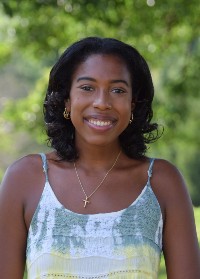 Moriah McDonald
Moriah McDonald
"How I Learned to Combat the Effects of Racial Battle Fatigue"
I am Moriah McDonald, the daughter of Melissa, a doctoral candidate, the granddaughter of Carolyn, a career secretary, the great-granddaughter of Leila, a sharecropper, and the great-great-granddaughter of Hattie, a Georgian slave.
Currently, I am a first-semester senior majoring in Psychology with minors in Honors Interdisciplinary Studies and African, African American, and Diaspora Studies (AAAD). I currently serve as the vice president of Omicron Delta Kappa, the secretary of Psychology Club, and a social media intern at the AAAD Department, and am a member of Psi Chi, Phi Beta Kappa, and Women of Color. I plan to become a licensed clinical psychologist with a concentration in identity-related stress and anxiety, seeking particularly to help people with diverse backgrounds and identities shift their mindsets in a manner that will combat the effects of discrimination and improve the quality of their lives.
I come from a culture where the act of storytelling is the substance of our heritage. Stories help us to see ourselves on a wider spectrum and help us make sense of the environment in which we live. I grew up hearing myriad stories of my forefathers: tales about how my grandmother was not allowed to use the same rest room as her white coworkers in the 1960s, narratives about the blatant injustices my great-grandfather (one of Trenton, New Jersey’s first black police officers) encountered from peers and criminals alike, and accounts of kindness from strangers who helped my family along the way. The synthesis of these stories has shaped me into the person that I am today and has made me curious about the factors that shape human behavior.
"How I Learned to Combat the Effects of Racial Battle Fatigue" is a memory; it is my journey of self-consciousness, personal circumspection, awakening, and, finally, acceptance of myself and the world around me. I wrote the piece for an Honors College seminar titled "Stories That Heal: Narrative in the Helping Professions," and I greatly appreciate how my professor, Lucy Malenke, and my classmates encouraged me to be vulnerable in sharing my story in an academic space. Their genuine curiosity and empathy regarding my experiences helped me to realize the power in storytelling as a means of personal healing and extending social consciousness or connectedness.
I believe that Whitten Maher would appreciate this piece because, although it is a bit agonizing at times, it opens a portal into what it is like to belong to a group of people who are systemically misunderstood, and often off-course, in places where they should feel at home. Whitten sought a sort of “walking in their shoes” appreciation of others' lived experiences. My hope is that with a wider understanding of people’s stories, a greater appreciation for all will ensue. This dedication to common understanding is how we can build supportive communities within our diverse world.
2021-2022
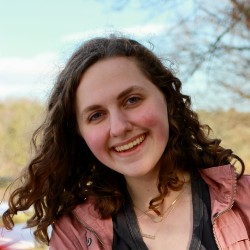 Mya Wilcox
Mya Wilcox
I am a sophomore Public Administration major from Richmond, Virginia, with a concentration in Public Policy and minors in Honors Interdisciplinary Studies and Spanish. The equitable flourishing of my communities, both on and off campus, is incredibly important to me, and I believe this must start with a solid relational and intellectual foundation; thus, I want to situate my studies and post-graduate work within the field of K-12 education policy.
Before someone can develop methods to pursue this kind of flourishing, it’s vital to spend time becoming informed of what's hindering it in the first place. That’s exactly what I did last summer as a teacher’s assistant in Richmond City Public Schools. My personal narrative about the experience, “The Opportunity to Learn,” was written for an Honors College seminar entitled “Stories That Heal: Narrative in the Helping Professions.” Rather than analyzing statistical data or reports, I connected names and stories to broader structural issues such as resource distribution and student support that I hope to address through policy in the future. I am so grateful for the ways Professor Lucy Malenke and my classmates challenged and encouraged me to reflect more deeply on these experiences (both personally and also more generally) through the development of this piece.
I believe that advocacy and policy formulation can be made richer through story, and I am confident that Whitten Maher believed similarly. In all of his Breeze pieces, Maher was easily relatable and deeply honest as he sought to inform his readers about pressing social issues and to call for change. My goal in sharing the detail, dialogue, and personal reflection in “The Opportunity to Learn” was to be honest about my own educational privilege and invite readers to join me in seeking change within the education system. I hope readers can empathize with my students' experiences as they wrestle with the circumstances surrounding their own educational outcomes. Maher was a master of blending empathy and community with fact in his work, and I hope to draw from his many examples as I continue my work in policy at JMU and beyond.
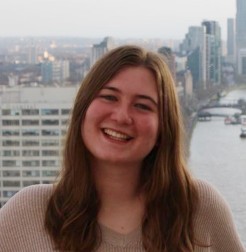 Kate Peppiatt
Kate Peppiatt
“The Internet: Pornography’s Ally, People’s Nightmare"
I am a junior Writing, Rhetoric and Technical Communication major with minors in Spanish and Honors Interdisciplinary Studies. I believe in the power of communication, and I am specifically interested in understanding how language conveys meaning to different audiences. Learning how to communicate effectively is an essential element of fostering environments in which every individual feels heard, where they feel their story matters.
Whitten Maher’s writing creates a space for open and authentic discussion in which readers can reflect and see their stories represented. His empathetic but realistic storytelling positions audiences to consider new issues and ideas. I sought to use this approach in "The Internet: Pornography’s Ally, People’s Nightmare," composed for my WRTC 301: Language, Law, and Ethics course. Professor Karen McDonnell asked us to consider how the internet intersects with and challenges the legal sphere, and a New York Times article by Nicholas Kristof compelled me to investigate the cycle of trauma that child pornography victims endure.
My piece uses the case of "Amy" to demonstrate how abuse uploaded to the internet perpetuates a cycle of trauma. I do my best to responsibly represent Amy and her story, basing my writing in her interviews to ensure that I portray her reality accurately and ethically, just as Whitten Maher did in his writing.
My purpose is not simply to educate individuals about a major problem in our current society. The next step in creating change is action. At the end of my piece, I present Senator Jeff Merkley’s proposed legislation that seeks to better regulate and stop the spread of child pornography via the internet. In presenting this legislation, I hope my writing encourages my audience to actively seek change.
2020-2021
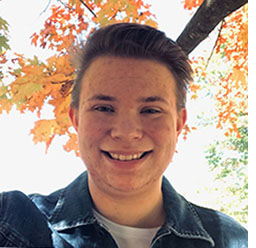 Ken Kensky
Ken Kensky
"Gender-Neutral Restrooms at James Madison University"
I’m Ken, a sophomore Media Arts and Design (SMAD) major with a concentration in Creative Advertising and minors in Sociology and Jazz Studies.
While many may consider a major in advertising an inherent endorsement of the rampant commercialism in our country, I see advertising as a force for change. Whitten Maher saw this same opportunity in his work. His articles such as "For You, Wherever You Are" reached out to marginalized groups and encouraged acceptance and empathy. I dream of using my career in a similar way to lift up minorities and champion compassion for those in need.
I consider myself lucky that I am already able to get started on this work. I was elected Media Manager for Madison Equality, JMU’s oldest LGBTQ+ student organization, and I use the skills I am learning in SMAD to reach out to the LGBTQ+ population on campus and to spread awareness about issues the community faces. One of these issues is the difficulty transgender students face finding gender-neutral restrooms on campus. As a transgender student, I have experienced this firsthand.
When my SMAD 203 professor, Dr. Nan Zheng, introduced our first "Foundations of User Experience Design" project—to turn a need we have seen among JMU students into a design question—I immediately knew the path I would pursue. My design question focused on how might we improve the experience of students trying to discover new gender-neutral restrooms around campus.
I explored this question in "Gender-Neutral Restrooms at James Madison University" through interviews with transgender students at JMU. While many of my interviewees agreed to have their comments shared with a wider audience, I was careful to anonymize everyone who wished to remain more private. My findings confirmed my hypothesis that there is a community-wide need for better resources about gender neutral restrooms. I hope JMU will consider my research and make changes to the resources it offers regarding gender-neutral restrooms.
As a member of the LGBTQ+ community, I am sure Whitten Maher would appreciate the struggles that I and other gender non-conforming students face at JMU. In the same way Maher used his platform to speak for marginalized groups, I hope to use mine to speak for transgender students at JMU and to bring about meaningful change.
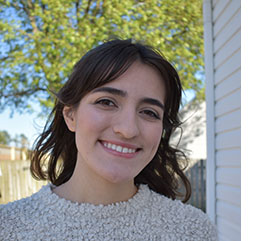 Ashlyn Campbell
Ashlyn Campbell
“Community Organizes Against Growth of Middle River Regional Jail"
I am a sophomore Media Arts and Design major in the Honors College with minors in Political Science and Women’s, Gender, and Sexuality Studies. Journalism calls to me because it gives me the ability to share and uplift important stories that often go unrecognized as well as sharing civic truths community members need to know. Outside of my academic work, I am a member of the Marching Royal Dukes, where I play mellophone, a member of the professional music fraternity Sigma Alpha Iota, news editor for The Breeze, and a student assistant in the Honors College. Although I don’t know the exact path that I would like to follow, whatever I do will be informed by my passion for bringing important stories to my community.
I wrote "Community Organizes Against Growth of Middle River Regional Jail" for the News section of The Breeze. Over-incarceration touches and impacts so many lives within our community. It’s easy to overlook those who are incarcerated, but I wanted to shed light on how our friends, neighbors, and families are impacted. I wanted to show how political policies can impact and create suffering for those living right next door. I wanted to bring the issue to the JMU community and show students how they can make a difference in our area.
Whitten Maher left a magnificent impact at JMU and on every person’s life that he touched. In "For You, Wherever You Are" for The Breeze, he wrote that everyone deserves a voice. I hope to give everyone a voice through this article and through every article I write for the rest of my life. I want everyone to know they deserve to be heard. I hope to inspire those around me to learn and engage and care for the community around them. When we all come together and care for one another, we’re so much stronger.
2019-2020
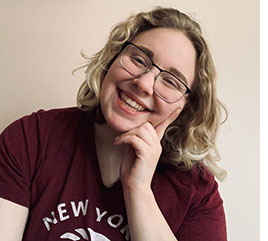 Lillie Jacob
Lillie Jacob
"Leslie Feinberg’s Stone Butch Blues: Finding Myself in the Margins"
I am a senior English major in the Honors College intending to graduate Spring 2021 with minors in African, African American, and Diaspora Studies (AAAD), Women’s, Gender and Sexuality Studies (WGSS), and History. I believe my areas of specialization within English are best expressed through my minors, as I am interested in the representation and voice of oppressed and often erased communities within literature and media. I focus on queer authorship, butch lesbian identity, queer masculinities, and the intersection of identities. In addition to my work as an English major, I am president of the English Honors fraternity Sigma Tau Delta, chief editor of the feminist zine on campus Sister Speak, a member of Phi Beta Kappa and Phi Kappa Phi, and an intern at JMU Special Collections. I plan to pursue a PhD in English or American Studies, as I want to add to the conversation on LGBTQ+ identity through my research and create safe spaces for LGBTQ+ students within my future classrooms.
I wrote my scholarship submission, “Leslie Feinberg’s Stone Butch Blues: Finding Myself in the Margins,” as my final project for “Queer Literature: Queer Identities, Queer Communities,” an English course taught by Dr. Dawn Goode. We had three options for our final assignment: a traditional analytical English essay, a syllabus project, or creative criticism. I decided to do the third option on Stone Butch Blues because creative criticism focuses on analyzing both the text and one’s own emotional response to the text, which allowed me to explore a book that changed my life as well as my own butch lesbian identity, sexual trauma, and complicated relationship with gender. This essay is deeply personal and if I’m being honest, I almost didn’t write it. It was a terrifying prospect for me to write about myself and my trauma, but I chose to do so because I wish I could have read something about people like me earlier in my life; it would’ve saved me from feeling like I was in a world of alienation with no words to describe it. As Whitten Maher said in his 2009 Breeze column “For You, Wherever You Are,” which addressed his own struggle with identity, “we all need a voice, even if it’s just a brief exclamation.” This essay is that brief exclamation for me.
When Whitten Maher came out, he was a beacon of hope for LGTBQ+ students on this campus. His choice to reveal his identity could not have been an easy one, but it showed other students that they were not alone. In the same way, my choice to write this essay, and to share it, has not been easy for me, but I want to provide visibility for those of us who struggle with sexual trauma and lesbians who struggle with gender. My hope is that this essay will say to anyone who has ever been sexually assaulted: you are not alone. To every kid who grew up feeling that they didn’t fit into an acceptable category: you are not alone. To every marginalized person on this campus: you can and will find community. There are beautiful things ahead of you.
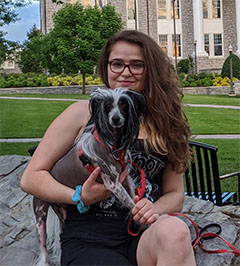 Davia Strider
Davia Strider
Originally from Charles Town, West Virginia, I am a junior Justice Studies major with a concentration in Social Justice. I have always attempted to create an inclusive and diversified atmosphere wherever I go, which is what led me to Justice Studies.
My commitment to advocating for people with disabilities (PWD) really grew when I enrolled in the Disability and Justice course in fall of 2019. For our first assignment, we were asked to write a story about how our connection between Justice and disabilities began. I wrote “I Am Here” to inspire and help others who may feel misunderstood and unrecognized in a world not built for people with disabilities.
Whitten Maher started a movement for JMU students to stand up and speak out for what they believe in, and I am honored to be a part of this movement. I hope “I Am Here” can spark in readers the inclusion, understanding, and compassion that is so urgently central in pieces like Maher’s “For You, Wherever You Are.”
I plan on continuing my education and commitment towards people with disabilities by combining my schooling and passion for animals. I hope to get involved in helping PWD through training and orienting service dogs to help with their handlers’ specific needs. I hope to show PWD that they are not alone and that I am listening to what they want and need.
2018-2019
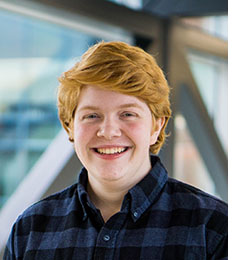 Spencer Law
Spencer Law
I am a junior Media Arts and Design and History double major in the Honors College. I have concentrations in each of my areas of study: Interactive Design, Public History, and Creativity, respectively. I'm interested in the intersection of design, writing, social history, and storytelling, which I explore through my academic career. To me, history is best told as the story of everyday people and the world around them. I strive to create work that shares the value of diversity, justice, and open-mindedness. My goal is to understand and implement ways to share the history of minority groups with the public, which I plan to do through graduate study and a career in public history.
I completed "A Journey Inward" as a part of my "Creativity and the Search for Self" Honors course, taught by Professor Jared Featherstone. The final assignment for this class asked students to explore one aspect of their conception of self in a creative and meaningful way. Rather than explain my career goals or religious beliefs as my sense of self, I decided to be vulnerable and open up about my identity. In the same way that Whitten Maher disclosed his identity as gay to the JMU community in the Breeze, I disclosed my identity as transgender to my class through this project. Sharing my identity is invariably a tense and awkward situation, but it was important to me that students in my class had an example of a transgender person they know in real life, instead of a stereotypical television character or celebrity. Whitten Maher was one of the first people at JMU to start the conversation about the LGBTQ students here, and this project is part of my effort to keep that conversation going.
Telling my own story to others gave me the opportunity to humanize a community that is so often marginalized and subject to violence. Though I can’t know what each person will take away from my project, I feel assured that my work can bring to light an often ignored population at JMU and promote empathy for LGBTQ students. It would be easy for me to hide who I am around my peers—just as it would have been easy for Whitten Maher to not disclose his identity. But knowing that he and other students after him have been bold enough to show their true selves on campus gave me the confidence to make and present this project.
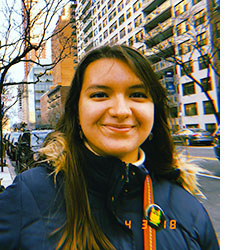 Renessa Rabenda
Renessa Rabenda
"Women and Their Worth: Equality on Campus"
I am a sophomore majoring in Art History with a Museum Studies concentration and a Spanish Minor. I am a Lisanby Scholar, a Preservation Assistant for Carrier Library’s Special Collections, and a co-Service chair for Kappa Pi, James Madison University’s art honor fraternity.
Outside the world of academia, I am an art historian who believes strongly in the importance of the arts in our communities. I hope to serve as a museum educator for art museums like the Brooklyn Museum and the Metropolitan Museum of Art, as I am passionate about teaching children, families, and adults to express themselves creatively and to value our visual culture and history.
My Whitten Maher Memorial Scholarship submission, titled “Women and Their Worth: Equality on Campus,” is an exhibit for Carrier Library’s Special Collections that traces the progression of women’s rights at JMU. In curating the exhibit, I sought to create a space of reflection where viewers can engage in interpersonal dialogue with JMU students, faculty, and staff through more than a century of James Madison history. In a larger sense, I hope the exhibit encourages viewers of all identities to recognize how far we have come and to keep striving for a better, more equitable world.
2017-2018
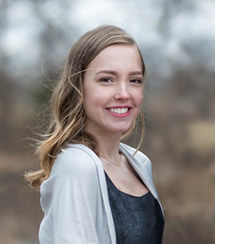 Abigail Mumma ('19)
Abigail Mumma ('19)
"After the March"*
I am a junior Media Arts and Design and Writing, Rhetoric and Technical Communication double major. By virtue of my academic pursuits, both design and writing have huge influences on my work. I believe that communication should be a holistic endeavor that considers both the message and the modes of delivery. I often encounter the belief that designers don’t know how to effectively write and writers don’t understand visual rhetoric. As the current Design Editor of The Bluestone, and the 2018-2019 Editor-in-Chief, it’s enthralling to see Whitten Maher combine design and writing so successfully.
Maher’s "And So We March" stands out for me because of the continuing relevance of public demonstrations of protest. The context he provides for his own experience at the National Equality March is exactly the same framework I have tried to establish in my own writing. So much misunderstanding of dissent comes from the inability to see the experiences of minority groups as a reaction to systemic issues rather than an isolated spark of anger. It is an esteemed but difficult duty for writers of history to capture the cultural context in which events occur.
I created "After the March" for my SMAD 231 class. It is a multimedia piece that covers my experiences at the D.C. Women’s March and the grassroots political movement that has followed. Quite simply, the experience transformed how I, as a woman, view both gender and political involvement. I empathize with the feeling of exhaustion Maher expresses at the “compromise and political cowardice” in the advancement of civil rights. But there is a similarity between the women I documented and Maher’s marchers that goes beyond frustration. The bravery we find in making our personal experiences a source of power and inspiration for others is the reason cultural change is able to take root.
* "After the March" was created in the Atavist publishing platform; the file disappeared from the web after Atavist was acquired by another company.
2016-2017
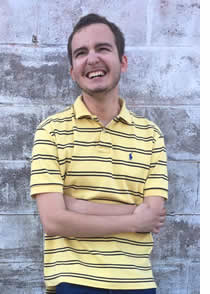 Michael Dolzer ('18)
Michael Dolzer ('18)
I am a Media Arts and Design and Writing, Rhetoric and Technical Communication double major. As a bisexual man, reading Whitten Maher’s articles is empowering. In his piece "And So We March," Whitten talks about how same-sex marriage legislation shows that the government only recognizes certain forms of love, and that we must keep fighting until we are treated equally. His words ring true today, as the LGBTQ+ community is facing similarly trying times. My rights and the rights of other minority groups could be denied because of who we are, and people like Whitten fought too hard for me to sit silently.
As the Managing Editor of The Breeze and Editor-in-Chief of Port & Main Magazine, I have had the opportunity to write about issues ranging from prison recidivism to a student who came from the Middle East, and to assign so many more advocacy stories to writers so that these publications could tell stories that would have gone untold. I also take being a voice for the voiceless literally, as I co-host a weekly social justice talk show on WXJM, where I discuss the issues affecting marginalized groups and what we can do to fix them.
Someone who shares Whitten’s bravery is Rain Garant, a transgender student whose story I recently shared in The Breeze. Rain’s story affected me—someone who was supposed to be an impartial journalist—because I could relate to him. I wanted to put a face on a group that many people do not understand, and I want his story to be a beacon of hope for others who live their lives on the margins. My only goal is for my work to make a difference, just like Whitten did.
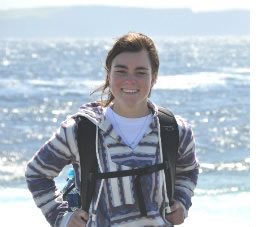 Sarah Beidleman ('18)
Sarah Beidleman ('18)
I am a Media Arts and Design major with a double minor in Creative Writing and Studio Art. In my free time, I love traveling and taking pictures. I am also in the Phi Mu sorority and have become very involved with the philanthropic events we support. The one closest to my heart is MadiTHON, a twelve-hour dance marathon to raise money for Children’s Miracle Network Hospitals. Miracle Kids and their families come for at least part of the event to dance with our sorority and tons of other organizations that support us. In the future, I would love to continue advertising for a non-profit organization, like CMN, not only because I can see who exactly my work affects, but because it helps support those in need who often are not in a position to speak for themselves. Perhaps this is what drew me to those in the crabbing industry.
When I was young, I stayed at my grandmother’s house in Southern Maryland on the Potomac River over the summer and watched the crabbers fish the nets early every morning. Crabbing and fishing is a huge industry in the area, and Maryland may be on the map because of blue crabs, but not many people know much about the watermen and what they go through. I wanted to highlight these people. “Crabbing, Culling, Repeat” is about a very specific group of people in a small town, with limited options, who continue to get up and get out on the water day in and day out.
Bringing this topic to Harrisonburg, Virginia, and beyond was important to me because many people take college for granted. In many areas, it is expected that students graduate from high school and continue their education at a four-year college followed by graduate school or full-time employment. My goal in telling the story of the crabbers and their underappreciated work was to show the other side of life.
The Whitten Maher Memorial Scholarship seeks to educate audiences about populations who are unrecognized or misunderstood. and I can tell you, after I interviewed these men, that they absolutely fall in this category. At the same time, it can be applied to many workers in many industries in similar situations. Whitten Maher wrote unique, local stories that engaged issues of national importance. I hope “Crabbing, Culling, Repeat” can do just that.
2015-2016
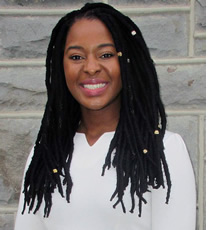 Adaoma Okafor ('17)
Adaoma Okafor ('17)
"Man Down! Man Down! A Tribute to Our Fallen Soldiers"
I am a Justice Studies major with a minor in Writing, Rhetoric and Technical Communication. Upon graduating, I plan to attend law school to further my dream of becoming an attorney. I believe passionately in the urgent need for criminal justice reform and the right of all people—regardless of race, sexual orientation, gender, religion, and socioeconomic status—to have effective representation when dealing with the justice system.
My commitment to serving others has prompted my involvement with the Community Service Learning Office here at JMU. I also work with the Office of Orientation as an Orientation Peer Adviser and with student government, where I’ll serve as the Student Liaison to the Board of Visitors during the 2016-2017 academic year.
I am originally from Lagos, Nigeria, and during my first year at James Madison, I experienced a sense of displacement because I was an immigrant and a person of color. This is why I feel that it is important to encourage groups of people who feel marginalized or silenced.
In its final recognition of the possibility for hope, Whitten Maher’s 2008 Breeze column titled "The Last Temptation of a Skeptic" reminds me of my journey at James Madison. My submission to the Whitten Maher Memorial Scholarship competition describes my internal struggle as a person of color in a society where I did not feel valued, an experience that could be applicable to people belonging to a variety of marginalized populations. Just when I thought I knew how my time here at JMU was going to end, the story changed, and in turn changed me. In "Man Down! Man Down! A Tribute to Our Fallen Soldiers," I tell a story of hopelessness, a story of self-discovery, and finally, a story of victory.
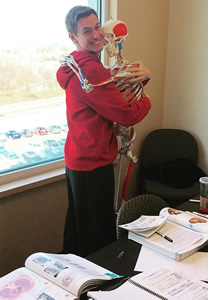 Tyler Garza ('17)
Tyler Garza ('17)
I am a Kinesiology major in the Pre-Physical Therapy program. I also play trumpet in the Marching Royal Dukes and mellophone in the pep band. My passion for helping others and watching them grow informs my desire to serve as a physical therapist. I am very good at motivating others to achieve their potential.
Growing up as a homosexual man, I can easily identify with the ideals Whitten Maher expresses in articles like "For You, Wherever You Are." Maher wanted the LGBTQ+ community to be understood. He wanted all of the LGBTQ+ youth, closeted or out, to know they are not alone. I wish I had read some of his works when I was younger.
People don’t understand what it’s like to be in the closet. People know the term and what it refers to, but they don’t understand the weight of what it really means. They don’t understand that being in the closet is miserable and lonely when you don’t find the support you need. As Maher said, “Some do fine. Some don’t.”
I love telling the story that I recount in "Finding My New Emily." I love when people care enough to ask. I understand that my experience is not a unique one, as many people have gone through similar feelings, but isn’t that what I want to convey? Sharing my story offers a small glimpse of what many LGBTQ+ youth feel growing up. People need to know what it’s like to be in the closet, and the importance of supporting those around them no matter what. The LGBTQ+ community needs to be more than tolerated. We need to be understood.
2014-2015
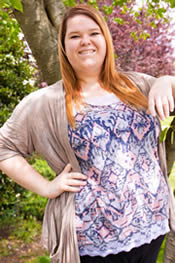 Lauren Hunt ('16)
Lauren Hunt ('16)
"Man's Best Friend: Freshman Nathan Selove Has Special Bond with his Disability Dog Sylvia"
I'm a senior Media Arts and Design major with a concentration in Journalism and minors in Creative Writing and British Communications and Media. I grew up in the small town of Amherst, Virginia, watching the news with my father like it was our job at 5 p.m., 6:30 p.m. and 11 p.m. Growing up in that kind of environment, it was only natural that I sought out the Journalism program here at JMU. I am always enthralled by stories of individuals who have overcome obstacles with the bravery and courage I wish to possess in my everyday life.
My natural curiosity drives me to seek out those who have stories and to share them with the rest of the world. This led me to the subject of my piece, Nathan Selove, who had been bullied for his Asperger's syndrome until he was given his autism service dog, Sylvia. After meeting Sylvia, Nathan's classmates began to understand his actions and the bullying eased. I hoped in sharing Nathan's story in The Breeze, James Madison University's student newspaper, to expose readers to another's experiences and perspectives and to promote empathy rather than judgment.
2013-2014
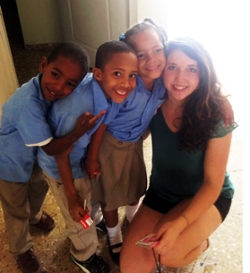 Victoria Price ('15)
Victoria Price ('15)
I was raised in the double-stoplight town of Elkton, Virginia, and my small-town upbringing and curiosity about people remain with me. Traveling to the Dominican Republic (DR) and observing the individuals there sharpened my understanding of suffering and the value of human rights. This understanding has altered the way I envision my own future as well as that of the bigger world to which I belong. I hope that my writing and involvement will help others build their own connections to our local and global neighbors. I plan to earn my master's degree in Writing, Rhetoric and Technical Communication at JMU and then attend law school to become a legal advocate.
The narrative piece I submitted to the Whitten Maher Memorial Scholarship competition was inspired by my continued involvement in the campaign for quality life in the Dominican Republic. My involvement began almost two years ago when I signed up for a two-semester seminar in global studies and service in the Dominican Republic. I was so inspired by the teachers and advocates I encountered, and their use of democratic avenues to fight for the right to adequate education that I returned a second time and became involved in a human rights campaign. I spoke with Haitian migrant workers and Dominican citizens of Haitian descent about their substandard and inhumane living conditions. Government legislation left thousands of people stateless on the island of La Hispaniola, rendering the DR a failed state. I wrote about the injustices that I encountered because narratives take root in the human conscience to then surface as action and change.
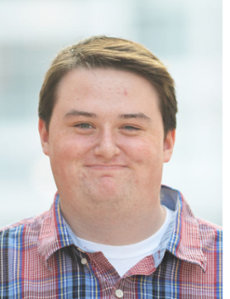 Corey Matthew Tierney ('15)
Corey Matthew Tierney ('15)
Originally from Winchester, Virginia, I am a senior Media Arts & Design major with a minor in Writing, Rhetoric and Technical Communication. Two of my biggest passions are community service and journalism, and I'm thrilled to have been able to practice (and merge) them every day here at JMU. As a Co-President of Sigma Alpha Lambda, an organization that values local community service, academic achievement, and leadership, I try my hardest to help those who are underrepresented or marginalized. As the Opinion Editor of The Breeze (a position that Whitten himself once held) and Editor-in-Chief of Port & Main Magazine, I strive for this same advocacy through writing and design. It has been so rewarding to print pieces on issues like LGBTQ rights, women's rights, inclusion, assault prevention, diversity, and privilege. I'm hoping that my work has sparked at least a little bit of discussion here on campus and inspired others to speak up and fight for equality.
My submission to the Whitten Maher Memorial Scholarship competition included both a written opinion piece and a newspaper page design. My layout featured an op-ed by Jacqueline Horton, a JMU student who in 2014 started the Minorities at Madison campaign to raise awareness about cases of racism and the lack of diversity on campus. I also wrote a piece on the positive impact of George Mason University’s gender-neutral dorm, a spectacular step forward for the transgender community and their fight for LGBTQ rights. Both pieces encourage empathy by placing the reader in the shoes of those affected and call on JMU to implement changes that make the university more inclusive and accepting of minorities. Finally, they are examples of writing that reaches out to minorities, much in the way Whitten did when he was with us.
